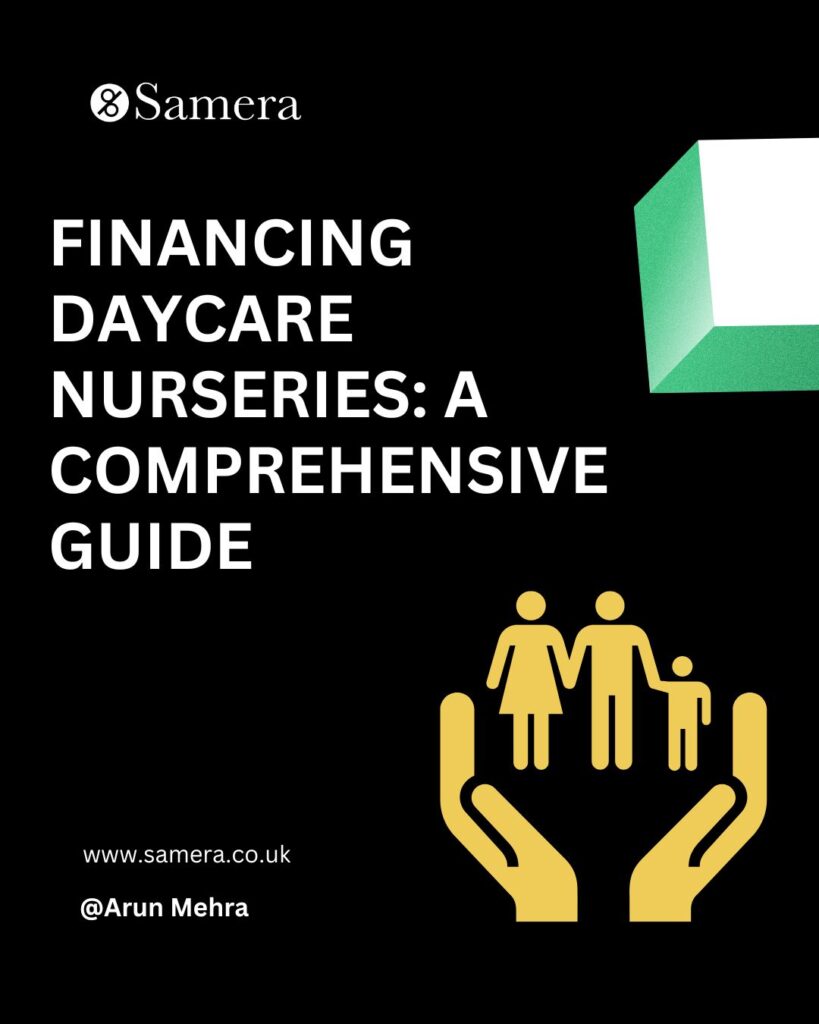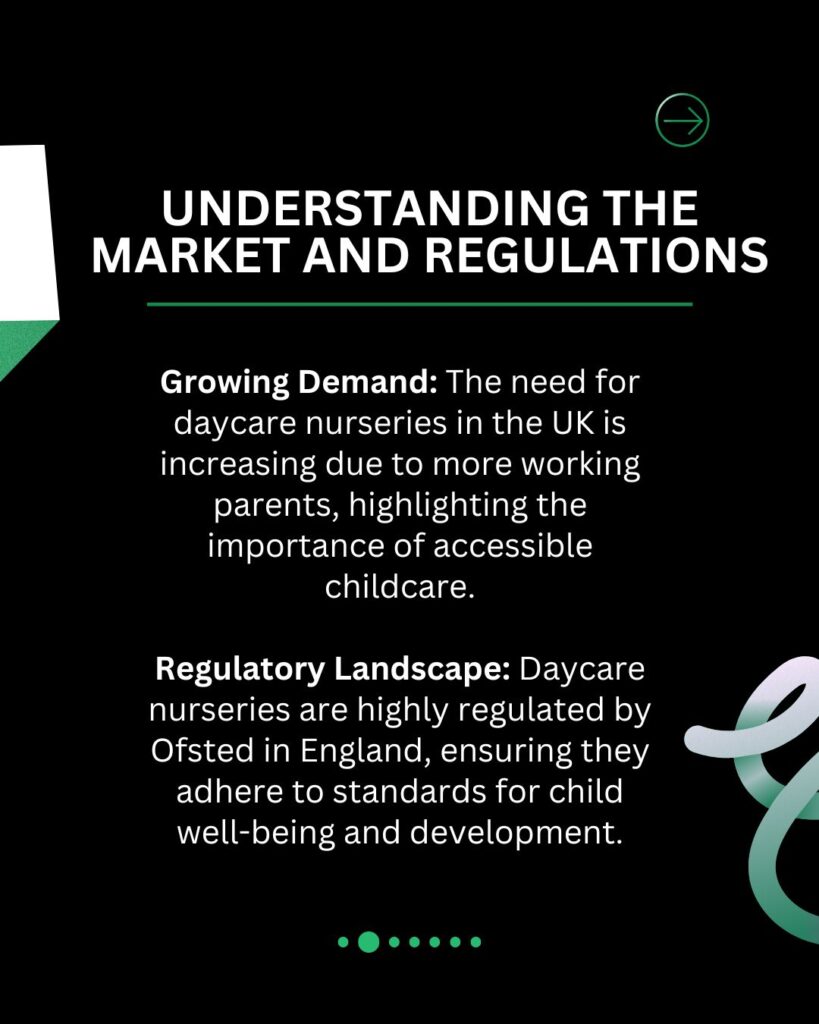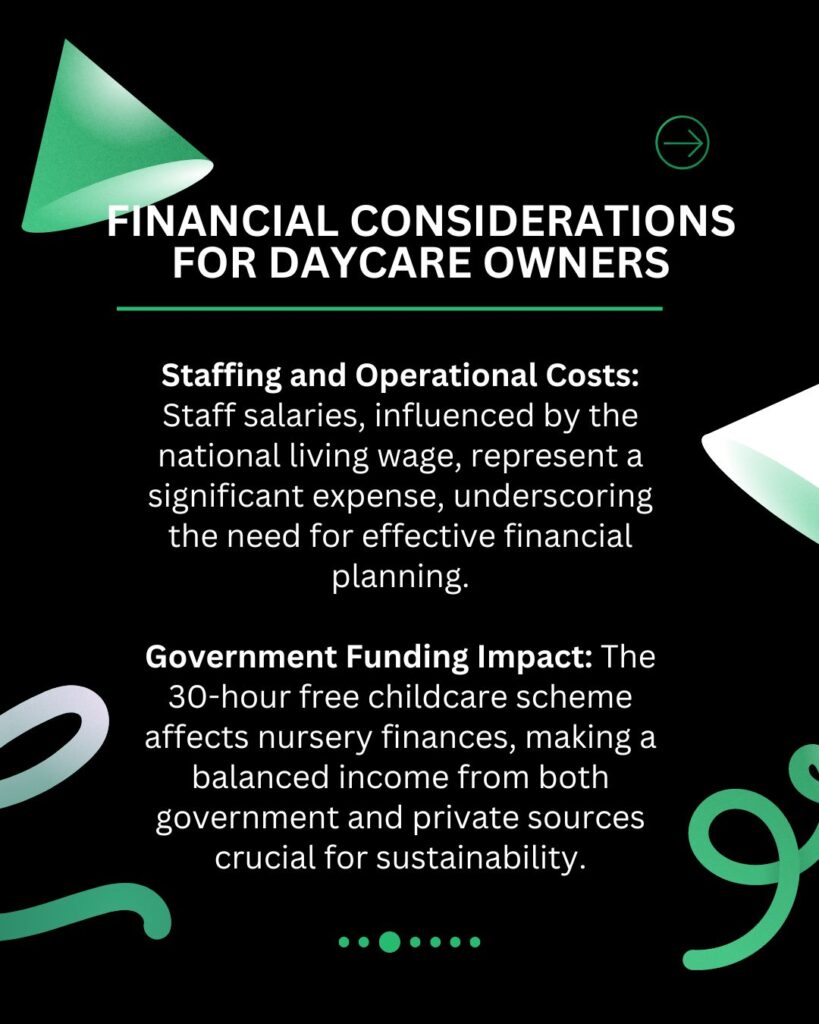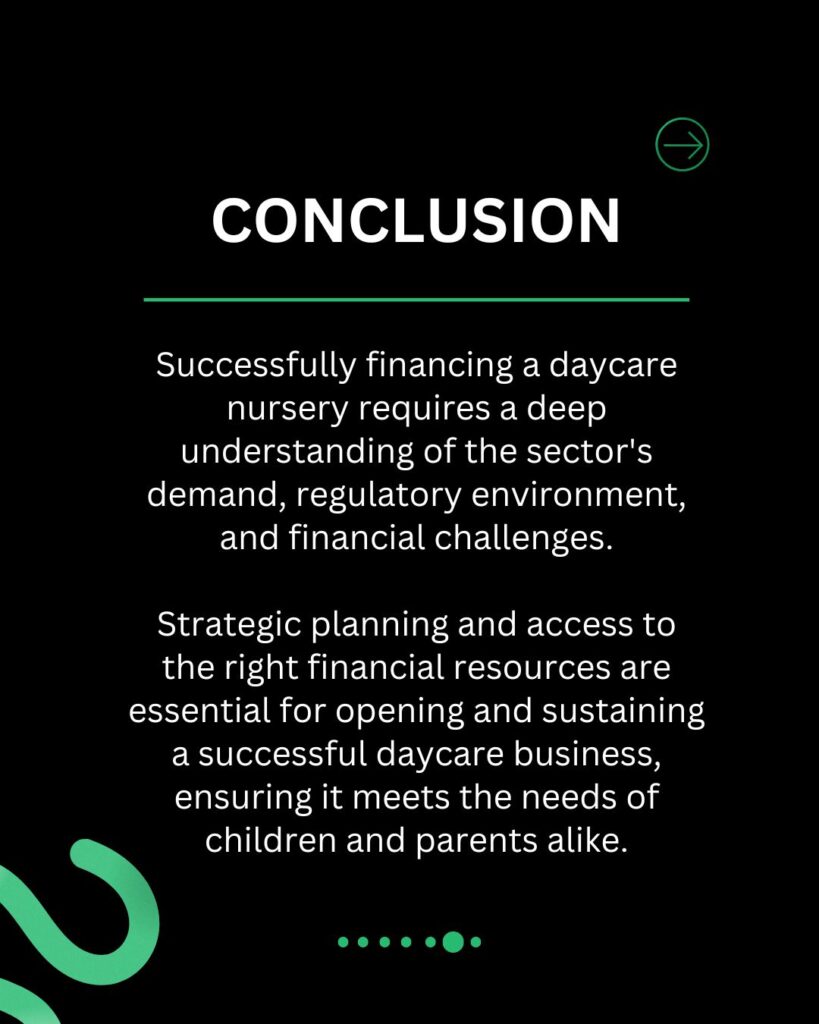Parents are busier than ever, and childcare has become a necessity for many working parents, this has seen a growth in the need for more daycare nurseries in the UK.
As you would imagine daycare nurseries are very highly regulated as they are responsible for the well-being of the children that attend. All nurseries in England are regulated by Ofsted (The Office for Standards in Education). They are expected to adhere to all the rules and regulations set out by Ofsted and they will also undertake inspections to make sure that a satisfactory level of care is being given and that appropriate records of the children’s developments are being kept.
Staffing will be one of the biggest costs to the business, the increases in national living wage have had an impact on the sector. Staff will also be one of the biggest assets and making sure they stay with the company will be important for future business growth.
Having a clear plan for training, promotion, retention, and recruitment will help the nursery maintain the correct number of staff needed to operate a successful nursery.
The government scheme that offers 30 hours of free childcare has impacted the sector and as many nurseries believe that the funds they receive from the government for these hours are not enough to cover their costs, this means that having an income split biased to private income is important to the overall business performance.

Finance for Day Care Owners
We believe that all aspiring daycare and nursery owners should have access to all the necessary information, finance options and support they need in order to successfully open and start their business.
You are one of many in the UK who would like to start their own day nursery. It has slowly become a very popular business venture, as a report by the Department of Education shows that there were 24,00 group-based early years providers in 2019 alone. This figure equates to 8,600 voluntary nurseries and 14,700 private nurseries. This report also states that daycares are in high demand.
We will guide you through the process of starting a successful day care centre. Your next steps will include:
- Purchasing a property
- Refurbishment funding
- Specialist regulations
- Equity purchase
- Tax funding
- Mortgages
Your Business Plan
There are many things you need to consider before you can even start planning your daycare business. If you are ready to enter the sector and make your business as successful as it can be, you need to begin with creating an in-depth, accurate, realistic business plan.
A Business plan is a road map for your business, it will help plan a strategy for marketing, and recruitment and set priorities. The plan is important for existing and start-up businesses and if the business requires finance, lenders will want to see a business plan which sets out the businesses goals, the experience of the management team, and a cash-flow forecast setting out the profitability of the business over the next 2-3 years.

Contact us to find out more
A daycare’s business plan must take into account the unique features that are included in operating in the childcare sector. New entrants should have a clear understanding of the market, the vision for your business and the regulatory environment in which you will be operating. It is very easy to get misled by assumptions based on limited experiences and headlines within a limited division of the sector.
Your business plan will aid you in getting the necessary financing you will need to begin your business and it will also help you stay on track, remain within your budget and, most importantly, it will secure all that important funding.
It is definitely worth spending time on a long, in-depth business plan – a few pages of notes will not suffice. Your business plan needs to prove that you have thought through every single aspect, every angle, and every cost of what will come with starting your daycare business.
Click here for more information on creating a business plan.
Here are a few things you need to consider while you are constructing your business plan:
Local environment
A day-care nursery’s business plan should take local demand into account. or be evidently prepared with a strategy to disrupt it. This could include offering services or incentives that your competition doesn’t, such as payment plans or offers that are strong enough to attract local parents who aren’t fully prepared to pay privately.
Fees and extra charges
Not only will you have to carefully plan what you will be charging your clients, but also what your costs to set up will be first. They are both as important as each other. These details, which you may think are minor irrelevant aspects of your business you can decide later, are what is really important. It will show your lender that you are a candidate who is well prepared and ready for a loan.
You need to explore whether the parents will be willing to pay for nappies or would be paying for food, if so, how much? Small details like this that will essentially outline how much income you will receive will set you apart from lenders.
Finance and funding
Based on your needs as a business you need to consider what kind of financing you will need. You may want to consider private-equity funding. Investors are getting increasingly keen on the childcare sector as a strong long-term prospect. There are multiple sources of finance that will be available to you.
Future planning
Consider the size of your location and the feasibility of scaling and expansion. It is important to bear in mind that most regulators set minimum requirements for space per child which may limit your growth.
Government subsidies
Government grants are playing a greater role in childcare now than ever before however, they do vary from area to area. It is worth it for you to research what could be available to you.

Market Research
The day care and nursery sector is a very unique commercial environment, one that has many rules in place before you can even set up and one that can change very quickly as latest trends in provision take off. Not only is the success of your daycare business highly dependent on how you cater to both parental and children’s needs but is also highly dependent on whether your daycare business must meet the specific needs of its catchment area. Here are a few places to start:
Other businesses in the area
You need to download a list of all local registered providers from the relevant regulator. These are Ofsted in England, the Care Inspectorate in Wales, your local authority in Ireland and the Care Inspectorate in Scotland.
Local Needs, Demand and Demographics
Opening a daycare in an area where you have a lot of competition means that it is likely that you may struggle to get your business off the ground. Depending on how affluent the local area is will reflect the needs and expectations of your future clients. Looking at parenting groups on social media will give you an insight into what local parents are looking for.
Business structure
Most nurseries in the UK operate as limited companies.
If the nursery owns the trading/operating business and the freehold then they may decide to own these two entities in separate limited companies. This is normally referred to as Opco/Propco by lenders and they will tie in both businesses by way of security for any lending that they undertake to the nursery.
Here are a few matters that you need to be aware of before you enter the childcare sector:
Liability
Liability is important when deciding any business structure. Incorporation is usually the route most business owners take to minimise any personal risks. However, it is still important to have Directors and Officers cover, as this will enable you to still incur some liabilities.
Franchising Options
You may want to include in your business plan whether franchising will be an option for you. There are many nursery franchises available currently in the UK, which can be a great option for new entrants in the market. However, franchising your current established day care business can be a cost-effective way to build your business.
Unincorporated associations
If you choose to remain unincorporated it is important to ensure that your trustees and officers are protected by an appropriate insurance policy.
Charity Status
There is also an option for your daycare business to be a charitable nursery therefore, if you are considering this option you also need to consider the structure you would like to adopt.
Click here for more information on accounts, tax and structuring a business.
Location
Here are a few factors concerning the location of your site that will aid in your nursery’s chances of being successful:

Contact us to find out more
Local area
Access to outdoor space is an integral part of your daycare business. If the space you are looking at does not have its own grounds you need to be realistic about the walking distance to local playgrounds and parks.
Potential hazards
In this childcare industry providing a safe environment is paramount and should be always kept as a priority. Are there multiple floors? Are your staircases child-friendly?
Road Safety and Convenience
You need to understand that parents will be evaluating all these different aspects of your business. Examine the nearby street crossings and the amount of nearby parking available. What are the transport links like nearby?
Relationships
Build a strong relationship with the local authority, most areas will have a service/need that they are lacking and if you can offer these services, they will hopefully refer parents to your business. Having good contacts with the schools closest to the nursery will help with attracting new children and ultimately help with the business’s occupancy levels.
Valuation
If you choose to buy your premises, ensure that you have your premises properly valued to help avoid being under-insured.

Raising Finance for Daycare Nurseries
How do lenders view the premises within the Daycare Nursery sector?
If the nursery is based in a converted residential property then generally the loan to value (LTV) will be around the 65% mark, however, is based within a purpose-built/limited alternative use property then 55% LTV would be more realistic.
Loan to values (LTV) – these can be based on the bricks and mortar valuation of the freehold or the business trading valuation, lenders will normally decide which matrix that they would want to use, the valuation of the freehold/business will need to be undertaken by an independent valuer.
Loans are normally termed over 10-15 years. Some banks will allow you to make lump sum repayments with no charge which can help reduce the term and allow you to repay the loan earlier if that fits within your business model.
The most common ownership structure for a nursery will be as a limited company, this is partly due to tax. A limited company owner must pay corporation and dividend tax, whereas a sole trader will have to pay tax on all business profits. Your accountant will advise you on the most suitable ownership vehicle for your business.
Click here to read our guide on A Guide to Acquisition Finance
Security
Security – banks will take security for lending in this sector, normally a 1st legal charge over the nursery freehold, limited company debenture (legal charge over the companies’ assets) and a personal guarantee. In the case of Opco/Propco lending, the banks will normally cross-guarantee the operating and property company to tie in both the property asset and the trading income.
Finance for Daycare Nurseries with Samera
So how can we at Samera help you achieve your goal of owning a Day Care Nursery? Firstly, we have 30 years collective experience within the banking sector and for the last 10 years specialising within the healthcare sector.
Samera Finance can help with an initial assessment, deal structure, and business plans and help negotiate a competitive interest rate for your acquisition financing. We have contacts in all the major banks who have experience with this type of lending to ensure that you get the correct deal, especially with respect to the fees and interest rates. Deal with the wrong lender and they may not give you the favourable rates that healthcare professionals benefit from.
We will obtain for you several offers of finance enabling you to select the deal that suits your own circumstances we will guide you through the lending process and be the point of contact for the lender when they are unable to talk to you while you are working. This enables you to carry on working and if we need to talk through any points with you, we are available in the early evening to do so.

Click here to learn more about How to finance a healthcare business.
Financing a Day Care Nursery FAQ
What is daycare financing?
Daycare financing helps childcare providers secure funds for startup costs, business expansion, purchasing equipment, and managing operational expenses.
What types of loans are available for daycare businesses?
Daycare businesses have access to several types of loans to meet their financial needs:
- Business Loans: General loans that provide funds for day-to-day operations, facility improvements, or expansion.
- Equipment Financing: Loans specifically for purchasing or upgrading daycare equipment, such as playgrounds, furniture, or educational tools.
- Working Capital Loans: Short-term loans designed to cover operational expenses like payroll, rent, and utilities, especially during slow periods.
- SBA Loans: Government-backed loans (in the U.S.) that offer low-interest rates and favourable terms for small businesses, including daycare centres.
- Lines of Credit: A flexible financing option that allows daycare owners to borrow funds as needed, helping manage cash flow and covering unexpected expenses.
These financing options help daycare businesses grow, operate smoothly, and invest in their future.
Can I get a loan to start a daycare business?
Yes, startup loans and SBA loans are available to help cover the costs of launching a daycare, including licensing, property leases, and hiring staff.
How does daycare financing help grow my childcare business?
Daycare financing helps grow your childcare business by providing the necessary funds to:
- Expand Facilities: You can use financing to add more classrooms, upgrade playgrounds, or open new locations to accommodate more children.
- Purchase Equipment: Financing allows you to invest in educational tools, furniture, and technology, enhancing the quality of care and attracting more families.
- Hire Additional Staff: With daycare financing, you can hire qualified staff to maintain proper child-to-staff ratios, improving service and allowing for growth.
- Marketing and Advertising: Use financing to invest in marketing campaigns, boost your online presence, and attract new families to your daycare center.
- Improve Cash Flow: Working capital loans or lines of credit help manage cash flow, ensuring that operational expenses like payroll and utilities are covered, especially during slower seasons.
Overall, daycare financing enables you to invest in key areas that drive growth and improve the quality of care at your childcare center.
How can I apply for daycare financing?
To apply for daycare financing, follow these steps:
- Assess Your Financing Needs: Determine the amount of funding you need and the purpose, whether it’s for expanding facilities, purchasing equipment, or managing cash flow.
- Prepare Required Documents: Gather necessary documents such as:
Financial statements (profit and loss, balance sheets)
Business plan outlining your daycare’s growth strategy
Personal and business tax returns
Cash flow projections - Research Lenders: Look for lenders that specialize in daycare or small business financing. Compare interest rates, terms, and loan amounts.
- Submit Your Application: Fill out the lender’s application form, either online or in person, providing all necessary financial documentation.
- Review and Approval: Once submitted, the lender will assess your creditworthiness, financial stability, and business viability. Approval can take from 24 to 72 hours depending on the lender.
- Receive Funds: Upon approval, the funds are typically disbursed quickly, allowing you to invest in your daycare’s growth.
Proper preparation and choosing the right lender can streamline the application process and improve your chances of getting daycare financing.
How quickly can I get approved for daycare financing?
Many lenders approve daycare financing within 24 to 72 hours, depending on the loan type and completeness of your application.
Can I get daycare financing with bad credit?
Yes, some lenders offer daycare financing to individuals with bad credit, but these loans may come with higher interest rates or require collateral.
What are the interest rates for daycare financing?
Interest rates for daycare financing typically range from 5% to 15%, depending on your credit score, loan type, and the lender’s terms.
Can daycare financing be used to purchase equipment?
Yes, daycare financing can cover the cost of playground equipment, educational tools, furniture, and security systems to enhance your childcare facility.
How is daycare financing different from traditional business loans?
Daycare financing is designed specifically for the childcare industry, offering flexible terms that account for the unique expenses and revenue cycles of daycare centers.
Are government loans available for daycare centers?
Yes, government-backed loans like SBA loans are available, offering lower interest rates and favorable terms for daycare centers and small businesses.
How much can I borrow with daycare financing?
Daycare financing amounts vary but typically range from £5,000 to £500,000, depending on your business needs and financial situation.
What can I use daycare financing for?
Daycare financing can be used for a variety of purposes to support and grow your childcare business, including:
- Facility Renovations: Upgrade or expand your daycare center to accommodate more children or improve the space for safety and comfort.
- Equipment Purchases: Buy essential equipment such as playgrounds, educational tools, furniture, and security systems.
- Staff Hiring: Use funds to hire qualified staff, ensuring proper child-to-staff ratios and improving the quality of care.
- Marketing and Advertising: Invest in marketing campaigns, build your online presence, and attract new families to your daycare.
- Licensing and Regulatory Fees: Cover the costs of necessary licenses, certifications, and permits to ensure your daycare complies with local regulations.
- Operational Expenses: Manage day-to-day costs like payroll, rent, utilities, and supplies to maintain smooth business operations.
- Technology Upgrades: Invest in technology like management software or online booking systems to streamline administrative tasks.
Daycare financing is flexible and can be tailored to meet various needs for both short-term and long-term growth.
Can daycare financing help manage cash flow?
Yes, working capital loans and lines of credit can help manage cash flow, covering expenses like payroll, rent, and utilities during low enrollment periods.
Do I need a business plan to apply for daycare financing?
Yes, most lenders require a business plan outlining your daycare’s financials and growth strategy to evaluate your loan application.
About the Author

Arun Mehra
With almost twenty years of commercial experience and knowledge in Dentistry, Arun’s expertise is valued by hundreds of businesses across the UK. His financial acumen and know-how, along with his hands-on commercial expertise have helped clients, large and small, new and established to achieve great things.
Arun is the founder of the Samera Group, starting the business with just one client sitting at his father’s dining table. Fifteen years on, Team Samera now service hundreds of Dental clients, run exciting events, help clients raise finance, and are very active in helping clients buy or sell Dental practices.
Business Loans for Healthcare Businesses
We’ve been helping to fund the future of British healthcare businesses for over 20 years and our team are made up of former bankers with decades of experience in the UK’s healthcare lending sector.
You can find out more about working with Samera and the financial services we offer by booking a free consultation with one of the Samera team at a time that suits you (including evenings) or by reading more about our financial services at the links below.
For more information on raising finance for your healthcare business, including more articles, videos and webinars check out our Learning Centre here, full of articles and webinars like our How to Guide on Financing a Dental Practice.
Make sure you never miss any of our articles, webinars, videos or events by following us on Facebook, LinkedIn, YouTube and Instagram.



